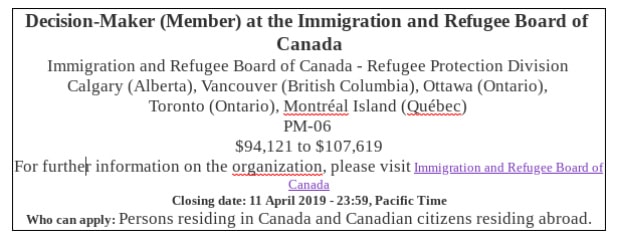
KJIPUKTUK (Halifax) – Ontario lawyer Yonatan Rozenszajn snagged one of the well-paid jobs (featured in the posting above) as a chairperson for Canada’s refugee claimants’ hearings, under the aegis of the Refugee Protection Division (RPD) of Canada’s Immigration and Refugee Board (IRB).
In April 2019, Rozenszajn heard the case of a Nigerian woman, Halima Alari (not her real name), who fled her ex-husband to come to Canada. She stated he had beaten her severely on many occasions, especially when she was pregnant with a girl-child, as he wanted a boy. He pursued her to another city where she had moved to escape him. After hearing her evidence, Rozenszajn asked, “Why does he keep on harassing you? If he really wants you to be gone, why doesn’t he just kill you?”
Shocked, Alari had no comeback. Later she told Global News “The judge made me feel as if I’m …. dead…. Like I’m not existing… like I’m a piece of trash.”
Alari felt demeaned because Rozenszajn treated her with contempt; the racist and misogynist treatment he meted out was totally unacceptable. Especially so in light of the written guidelines for adjudication which include gender-related claims of fear of persecution, and the special problems women face when “they have had experiences that are difficult and … humiliating to speak about.”
Ultimately Rozenszajn did not believe Alari; he rejected her claim. Alari is appealing his decision.
Global News reported that in the last three years, adjudicators at the IRB Toronto office rejected 63% of the vulnerable person applications they received. The Montreal office rejected 22% and the Vancouver office only rejected 6% of these cases.
This begs the question about unequal treatment by IRB judges. Overall, acceptance rates for individual judges ranged from 95% to 10%. In my former life as a university professor, when I was department chair, I was told I had to monitor the range of professors’ grades. Too broad a range of grades called the whole process into question.
Rozenszajn’s insulting and demeaning conduct did not sit well with Hilary Evans Cameron, a law professor at the Centre for Ethics at the University of Toronto.
She explained that it is crucial that refugee claimants must be “presumed to be telling the truth” until proved otherwise. Rozenszajn’s comments suggest he did not even start Alari’s hearing with that presumption. Farrah Khan, a sexual violence support worker, insisted the refugee board “isn’t doing its best to protect its most vulnerable claimants”.
Who exactly is the white and entitled Yonatan Rozenszajn? A lawyer from the Hamilton area, Rozenszajn was born in Israel. In the 2015 federal election he ran for the Conservatives in the riding of Hamilton Centre, where he placed a distant third. The NDP won the riding and the Liberals placed second.
During the election Jason Kenney, former Prime Minister Harper’s former Minister of Defence, stumped for Rozenszajn at an all-candidates meeting in Hamilton. At the meeting he seemed to echo Kenney’s hard line that continuing to bomb Syria was the only way to defeat “terrorism”. Of the NDP and the Liberals, Rozenszajn said, “They do not understand how to deal with these threats adequately… [the other parties would put Canada at risk on the altar of ideology.”
After running unsuccessfully for the Tories, Rozenszajn was appointed to adjudicate IRB hearings.
Appointments to adjudicator jobs at the IRB are often political. Another appointee, Lubomyr Luciuk, was re-appointed in 2018, after serving a two-year term in the late 1990s. Luciuk could be called a cold warrior. An avowed right-winger, he wrote in a 2015 article that his Ukrainian parents spent years in a “DP camp” after World War II before being allowed to emigrate to Canada. He recommended prospective immigrants spend years in a holding camp before getting the ‘privilege’ to come to Canada.
Luciuk also supported the idea that immigrants should be allowed to settle only where the Canadian government directed them to live, until they paid back their passage to Canada. Luciuk believed that’s what “all real refugees want.” Of course that is absurd. The immigration template used in 1948 would be wholly racist if used now, 70 years later. In the wake of WWII, nearly all immigrants were white and Christian (with a smattering of Jews). Refugees were all European. Canada eschewed all Japanese migrants, though they had suffered terrible misery after the Americans dropped atomic bombs on Hiroshima and Nagasaki.
In 2001, Luciuk wrote an op-ed article that appeared in four Canadian newspapers “How ‘Refugees’ and Terrorists Get into Canada.” In part he wrote:
“Be a liar. That is the first lesson most claimants who come before the Immigration and Refugee Board learn. How? Well, first of all, bring no identity documents, or use fake ones. Be vague about who you are, where you came from … repeatedly [insist] that you face nothing less than torture or even martyrdom if you return. Repeat this mantra. Practice looking downcast. Cry. Unless you are an utter imbecile you stand an excellent chance of getting … refugee status in Canada.”
A professor of political geography at the Royal Military College of Canada, Luciuk prided himself on being called “Dr No,” because he rejected 90% of refugee claims he heard between 1996-98. He boasted he “rarely encountered a real refugee.”
A spokesperson for the IRB said the Board had never seen the 2001 article, and that “the IRB does not support the content or tone of that article.” After a review by the IRB, Luciuk’s contract was not renewed for 2019.
Still, problems abound over the comments by Yonatan Rozenszajn.
Claimant Alari called Rozenszajn’s questions an “egregious violation” of the IRB’s guidelines for cases that involve sexual assault and domestic abuse. The IRB has guidelines here. Recently, the IRB admitted that Rozenszajn’s comments could be “construed as insensitive” and suggested he needed extra training. The IRB is now reviewing Rozenszajn’s decision.
So who gets these high-ticket appointments? Turns out that in 2011, half-way through the Harper era, 90% of appointees were Tories. Most claimants were denied by 30 Tory-appointed board members. And one Tory appointee, David McBean did not approve a single refugee claim in the 169 cases he heard.
But McBean must have done a good job, according to Jason Kenney, then Harper’s Minister of Immigration. McBean got a second five-year term.
I’m not suggesting that Kenney, or any Immigration minister is a puppet master who pulls strings and gets the immigration judges to do the party’s bidding. They don’t have to. The judges or chairpersons have a particular mindset and a general loyalty to the politics of the government who appointed them.
Currently there are 38 vacancies for chairpersons. If everything goes according to plan, Trudeau’s new Immigration Minister Marco Mendicino is obliged to fill the vacancies. Will political partisanship be the winner?
Judy Haiven is on the steering committee of Equity Watch, a Halifax-based organization which fights bullying, racism and discrimination in the workplace. You can reach her at equitywatchns@gmail.com
With a special thanks to our generous donors who make publication of the Nova Scotia Advocate possible.
Subscribe to the Nova Scotia Advocate weekly digest and never miss an article again. It’s free!



